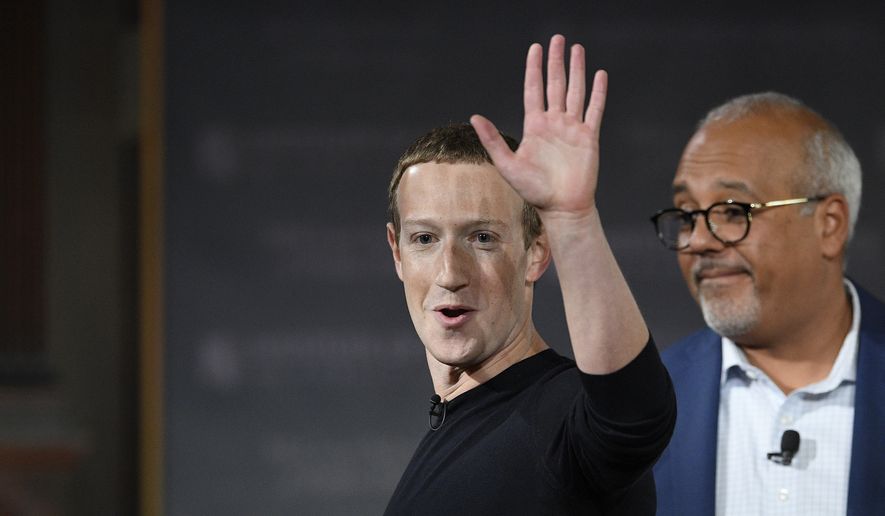Facebook CEO Mark Zuckerberg attempted to squelch allegations of political bias at his company Thursday by saying he must be fair because both Democrats and Republicans are “angry at us.”
Facebook has been the target of a barrage of criticism from the right for blocking conservative content and from the left for being a monopoly.
“I think it would be hard to be biased against both sides, but look, right now we’re doing a very good job of making everyone angry at us,” Mr. Zuckerberg said. “I think that that’s because my values on this and our beliefs don’t generally, they don’t hue to what either wing thinks we should be doing.”
He described his policy for political ads on Facebook as striving for fairness.
“I don’t believe that not fact-checking political ads is pro-conservative. I believe it is pro-challenger. I believe that banning political ads … favors incumbents,” he said at Georgetown University.
Mr. Zuckerbeg participated in a forum that was part of the school’s speaker series “Democracy in the Digital Age.” He spoke for more than 30 minutes before answering a handful of questions submitted by students.
His remarks focused on his view that Facebook valued “voice” and “inclusion” in the furtherance of free expression. Without identifying politicans such as Democratic presidential candidate Sen. Kamala Harris, of California, who have called for political opponents to be taken offline, Mr. Zuckerberg railed against the idea underpinning the practice of de-platforming.
“Some people believe that giving people a voice is driving division rather than bringing people together,” he said. “More people across the spectrum believe that achieving the political outcomes that they think matter is more important than every person having a voice and being heard. And I think that’s dangerous.”
Georgetown is the latest stop on Mr. Zuckerberg’s charm offensive aimed at skeptical audiences. Since July, Mr. Zuckerberg has privately courted political conservatives, reportedly including Sen. Lindsey Graham, Fox News personality Tucker Carlson and conservative commentator Ben Shapiro.
Many conservatives, however, remain skeptical of Mr. Zuckerberg’s approach.
The newly formed Internet Accountability Project is a conservative advocacy group aiming to get the federal and state government to rein in Big Tech companies such as Facebook, Amazon and Google.
“I’m glad he’s doing it, but these kinds of pats on the head are not enough,” said Rachel Bovard, IAP senior adviser and former legislative director for Sen. Rand Paul, Kentucky Republican, of Zuckerberg’s trek to Georgetown.
Ms. Bovard said platforms such as Facebook “allow human misery to flourish” and the time has come for meaningful action from government.
Congress this week began taking new action in the realm of internet regulation.
Sen. Marsha Blackburn, Tennessee Republican and leader of the Judiciary Committee tech task force, convened a closed-door meeting with policy experts Wednesday about consumer data privacy rights.
Participants included Maureen Ohlhausen, former acting chairwoman of the Federal Trade Commission and Baker Botts partner; Nathan Taylor, Morrison & Foerster partner; Michelle Richardson, the Center for Democracy & Technology’s director of its privacy and data project; and Jennifer Daskal, an American University associate law professor.
The House Energy and Commerce Committee, also on Wednesday, held a hearing on “fostering a healthier internet to protect consumers” featuring testimony from Steve Huffman, co-founder and CEO of Reddit, and Katherine Oyama, Google’s global head of intellectual property policy.
Next week, Mr. Zuckerberg is scheduled to face the House Financial Services Committee to answer questions about Facebook’s new cryptocurrency endeavor, named Libra.
• Ryan Lovelace can be reached at rlovelace@washingtontimes.com.




Please read our comment policy before commenting.